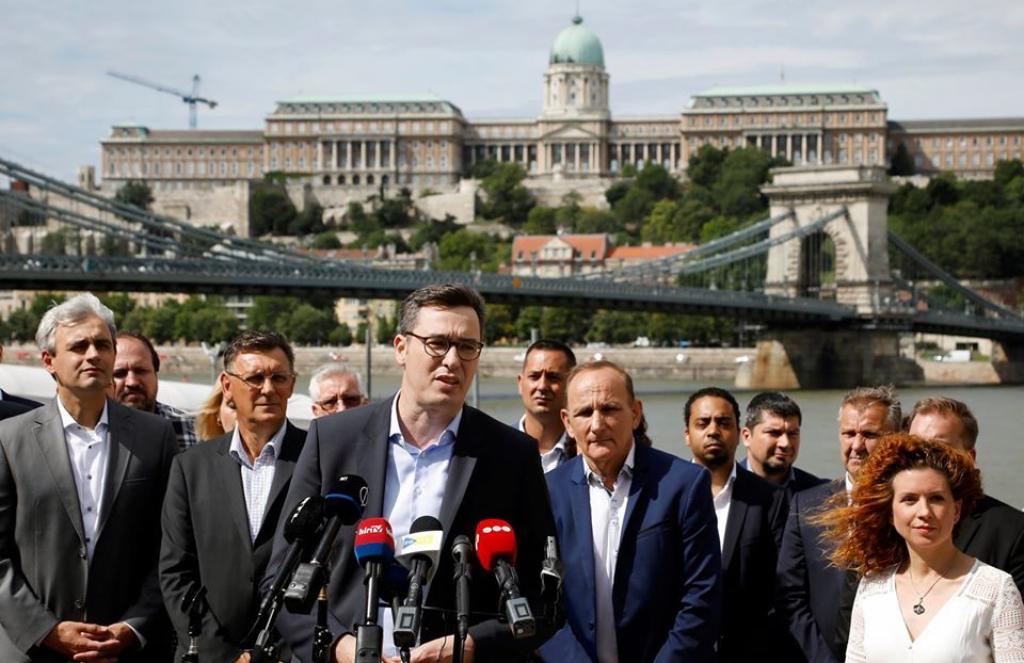Thessaloniki gets ready for its metro launch in November
The underground rapid transit lines have been under construction for almost two decades due to various project delays
 TheMayor.EU logo
TheMayor.EU logo 
Opposition and independent mayors in Hungary protest 2021 budget, Source: Gergely Karácsony Facebook page
Opposition and independent mayors protested the budget cuts and pledged to bolster the Alliance of Hungarian Municipalities
In spite of strong outcry by the opposition, the Fidesz dominated parliament in Hungary passed on Friday the state budget bill for 2021. The budget was approved with a vote of 133 for, 61 against and no abstentions. The Democratic Coalition (DK) voted against, labeling the budget a show of “weakness and cowardice”, and blaming the ruling party for turning a blind eye on the ramifications of the coronavirus epidemic.
At a news conference after the vote, summarised by MTI, Sándor Burány, deputy group leader of opposition Párbeszéd, said that through next year’s budget Fidesz has “taken revenge” on opposition-led municipalities. He estimated that towns and cities where the opposition won the local elections last autumn would have to meet rising costs with much smaller budgets next year. One such example is Budapest, which, for the first time in 30 years, would have to contribute more to the central budget than it would receive.
Reacting to the opposition claims, ruling Fidesz said in a statement that the 2021 budget allocates HUF 118 billion (EUR 335.1m) more to local governments than in 2020.
Rallying behind Budapest Mayor Gergely Karácsony, opposition and independent mayors from around Hungary protested on Friday the budget cuts and called for strengthening the Alliance of Hungarian Municipalities (MOSZ). According to Karácsony, the 2021 budget bill has a “clear political motive to destroy Hungary’s system of local councils”.
It is not only the mayors who are punished but the citizens, Karácsony said in his speech, noting that the Budapest tax, imposed to pool money into the so-called coronavirus “solidarity fund”, will deprive every Budapest resident of HUF 20 000 a year.
The Hungarian government is probably the only one in the world that does not treat local governments as partners during the epidemic and the economic crisis, but rather as enemies. There is no economic reason for bleeding local governments, said the Budapest mayor, pointing to what central and local authorities do differently.
The government wants to deal with the economic crisis by supporting the powerful and the rich, we want to help the individual, the local small business. And we do this, for example, in the capital with overhead subsidies, HUF 10 000 camp subsidies, discounts for businesses in distress, discounts for job seekers, employment programs in health care and elderly care, among others, explained Karácsony.
“I have said many times in the election campaign that the power of the mayor comes from the power of the settlement and this power is invincible,” concluded Karácsony, announcing the accession of Budapest to MOSZ and encouraging the mayors of free cities to follow suit.

The underground rapid transit lines have been under construction for almost two decades due to various project delays

Now you can get your wine in Talence by paying directly in Bitcoin

That’s because the state has to spend money on updating the railway infrastructure rather than subsidizing the cost of the popular pass

Rethinking renewable energy sources for the urban landscape

The examples, compiled by Beyond Fossil Fuels, can inform and inspire communities and entrepreneurs that still feel trepidation at the prospect of energy transition

Now you can get your wine in Talence by paying directly in Bitcoin

The 10th European Conference on Sustainable Cities and Towns (ESCT) sets the stage for stronger cooperation between the EU, national and local level to fast track Europe's transition to climate neutrality.

At least, that’s the promise made by the mayor of Paris, Anne Hidalgo

The underground rapid transit lines have been under construction for almost two decades due to various project delays

At least, that’s the promise made by the mayor of Paris, Anne Hidalgo

Hostal de Pinós is located in the geographical centre of the autonomous region

Despite its church-y name, the district has long been known as the hangout spot for the artsy crowds

Urban dwellers across the EU are having a say in making their surroundings friendlier to people and the environment.

Forests in the EU can help green the European construction industry and bolster a continent-wide push for architectural improvements.

Apply by 10 November and do your part for the transformation of European public spaces

An interview with the Mayor of a Polish city that seeks to reinvent itself

An interview with the newly elected ICLEI President and Mayor of Malmö

A conversation with the Mayor of Lisbon about the spirit and dimensions of innovation present in the Portuguese capital














